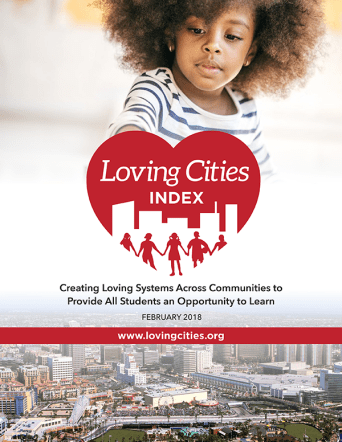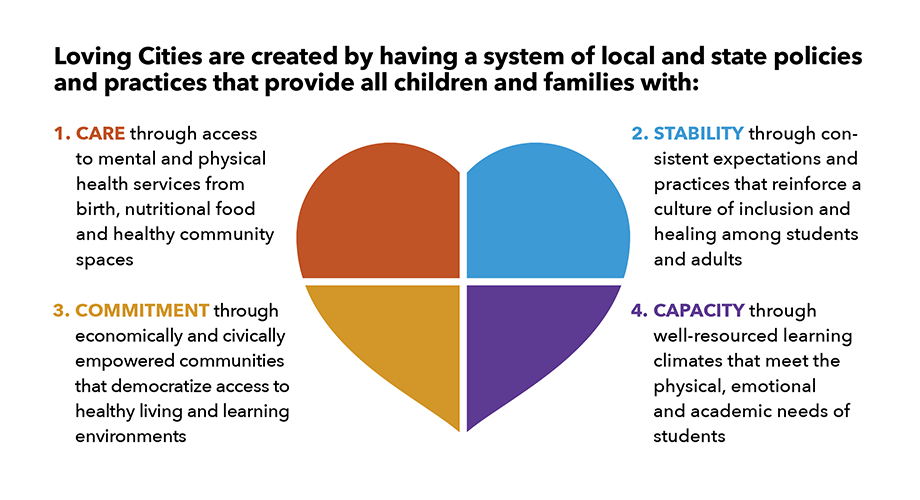Creating Loving Cities Rather Than “Separate and Unequal”

This blog is part of the series, Education and the Path to Equity, examining issues of education and equity 5 decades after the Kerner Commission issued its seminal report on racial division and disparities in the United States.
Fifty years ago, the Kerner Commission report warned that the conditions for Black people in our cities and the policies being implemented across our country were creating a “system of apartheid,” with separate and unequal societies for Black and White people. In the years immediately following the release of the report, the federal government made some important adjustments, creating policies that addressed many of the income- and race-based inequities in our systems. Unfortunately, that era of progress was short-lived.
Instead of continuing to challenge the blatant racism and implicit bias rooted in federal and local policies across the areas of housing, transportation, education, public health, and workforce development, the country’s policymakers largely turned to “color-blind” and “input-neutral” approaches—that is, approaches that rarely address the resources or supports needed to produce the desired outcomes, instead using common outcome standards as the driver.
The ideology of the 1980s, ’90s, and today has primarily focused on elevating “personal responsibility” and blaming the economically disadvantaged or the community workers who provide services to them instead of recognizing the systemic inequities in opportunities that exist and creating systems in which each child and his or her family have the supports to achieve high outcomes. As a result, two facts remain true at a systems level: The public school system remains the primary institution of education and opportunity for 9 in 10 students in America; and parental income remains the number one predictor of student outcomes—not the type of public school, the particulars of teacher labor contracts, or the brand of assessment used.
Decades of robust debates on education standards, assessments, accountability, labor contracts, and traditional vs. charter public schools have focused narrowly on the role of schools, classrooms, and teachers, while ignoring inequities in students’ neighborhood living environments. Research shows that those inequities—such as lack of access to affordable housing and health care—are reflected in unequal student outcomes and rates of success. Simply stated, every child needs both healthy living and learning climates to grow academically and to have a fair chance at succeeding.
Today, five decades after the Kerner Commission report, racial segregation of communities and schools continues to be pervasive and deeply impact children’s opportunity to learn and thrive, particularly for children of color and children from low-income households. Analysis of racial segregation measures for large metropolitan areas shows only nominal changes, on average, in levels of racial segregation in 2010 compared to 1990. This segregation, in conjunction with unfair school funding formulas and disinvestment in historically Black and Latino neighborhoods, has created separate and unequal living and learning environments where children do not have access to even the most basic resources and supports they need to learn and thrive.
This year, the Schott Foundation joined millions of parents, students, and community leaders in calling for “a new day in America” for young people. In February 2018, Schott launched the Loving Cities Index to outline and analyze the system of supports needed to affirmatively heal communities from the damage caused by decades of racialized policies, criminalization, and segregation.
While there are bright spots for all 10 cities studied (see below), the Loving Cities Index shows that the work is far from over, even in cities with relatively higher Index scores. All cities show high levels of people working full time who are still earning 200% below the federal poverty line. They also show a housing market crisis in which the majority of residents cannot find rental options affordable at their income levels. Fair wages, along with affordable and safe housing, are part of a system of supports that are critical to providing children and families with stable living environments where they can access quality jobs, as well as education and health resources—all of which are integral to ensuring children can succeed academically.
Loving Cities Report
The Loving Cities report collects and synthesizes data on an initial 10 American cities, which are scored based on 24 indicators.
- Baltimore, MD
- Buffalo, NY
- Charlotte, NC
- Chicago, IL
- Denver, CO
- Little Rock, AR
- Long Beach, CA
- Minneapolis, MN
- Philadelphia, PA
- Springfield, MA
Across all 10 cities there are very low levels of capacity to provide children with an opportunity to learn, which stems from extreme levels of economic and racial segregation in school. Students living in poverty face trauma and toxic stress that affect their physical, emotional, and behavioral health, and we rely heavily on schools and teachers to provide those students with the individualized supports they need to thrive. When schools are highly segregated economically, those needs cannot be adequately managed, and inequities in our school resourcing formulas mean that schools with the most need often have the fewest resources. These capacity constraints limit the availability of experienced teachers, access to advanced curriculum, and the ability of schools to provide support staff and services that meet all children where they are.
The analyses of 10 cities in the report underscore the fact that America must transition from a standards-based reform agenda to one that is supports based so that all students have an opportunity to learn and achieve deeper learning outcomes. The Loving Cities report is a call to action for governors, mayors, city councils, and school boards to adopt loving systems focused on providing healthy living and learning supports over unilateral standards.
Over the next several years, our best opportunity to overcome the impact of decades of policies and practices rooted in racism and hate is to collectively create loving systems in cities and communities across the nation. This is less about beginning another 50-year journey and more about communities making the commitment today to provide the cross-sector loving systems and supports that allow all students—regardless of race, ZIP code, or sexual orientation—to succeed and to thrive.
Dr. John H. Jackson is President and CEO of the Schott Foundation for Public Education.
Photo: Dr. John Jackson speaking at the event, Healing our Divided Society: Investing in America Fifty Years After the Kerner Report.


